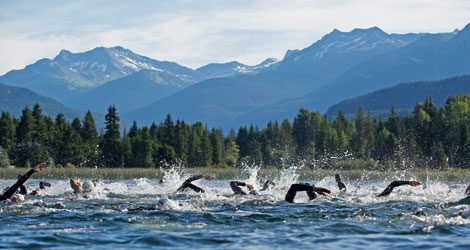Whistler Wind Up
LifeSport head coach Lance Watson on the new Ironman Canada race in Whistler, B.C.

In the first of our coaches columns, we asked LifeSport head coach, Lance Watson, for some of his thoughts and ideas about the new Ironman Canada race in Whistler, B.C.
TMC: What are your thoughts about Ironman Canada moving to Whistler?
Lance Watson: Initially there was some sadness. I think many of us grew up in the sport watching the legends of triathlon contest Penticton Ironman each year. Personally I have coached numerous wins on that course and that gives me a strong connection to that event. It seems a shame that a deal couldn’t be struck to keep one of the longest standing Ironman races in the world within that community.
Alternately, there will still be a Challenge race in Penticton, so athletes can still have the opportunity to contest that historic course. Whistler is an internationally recognized resort that has been well branded through the Olympics. The quality of hotels and restaurants are exceptional, there is great shopping in the village and many outdoor activities for family and friends. (I recommend athletes avoid their epic downhill mountain bike park until after their race, though.)
It is gorgeous there in the summer time and I am happy to have a reason to visit Whistler each year for race week and to run some training camps up there. I think the course will quickly assume status as one the premier Ironmans internationally.
I do hope the events (Challenge Penticton and Ironman Canada in Whistler) can be separated in the calendar year. Currently they sit on the same weekend. I am sure many athletes would attempt both races if they were three months apart. Also, the race in Penticton is crucial to that local economy, so ongoing success of the newly branded event is important to that region.
TMC: Since it’s a new Ironman course, how would you suggest people prepare?
LW: Preparing means, obviously, getting your mileage and key sets in, but each Ironman presents different and specific challenges, so learning the course as best you can and incorporating training specificity is really important.
TMC: Do you have some notes about the course?
LW: The swim will be two loops, wetsuit legal and a lake swim, so it should be fairly standard. It is typically 18 degrees Celsius at that time of year. The beach area isn’t huge, so I will be interested to see how race organizers deals with congestion.
The bike will be hilly and, in some ways, more challenging than Penticton. There is an nice initial downhill of about 10 km to get your legs moving. Then you turn towards the Whistler Olympic Park, which is a good 10km of climbing in stages, which is more challenging than Richter Pass in Penticton. It may be a little chilly in the morning, so this climb is a good way to get your core temperature up. After climbing back to Whistler you head towards Pemberton, which will be 35 to 40 km of downhill followed by some flat and potentially windy riding. The kicker is the final 35 km of climbing to get back to town. You’ll want to make sure and lots of energy left.
Running in Whistler is beautiful. This two-loop course will be rolling and there will be some gravel trail past Lost Lake. Altitude in the village is about 2,100 ft, so it should not present an issue for most. Peak temperature likely won’t exceed 25 C, so heat shouldn’t be an issue. The vibe at Whistler Village will be inspirational and spectacular.
Generally, the best thing to prepare for a race like this is to train on the course. Learning the intricacies of the course will give you a huge advantage to learn pacing over the terrain there, experience the conditions, and to mentally give you confidence. There will be training camps popping up there for sure. Having a guided tour, support, and coaching on the course is the way to do it.
TMC: Are there any races you feel would be best suited as a tune up for Ironman Canada in Whistler?
LW: Picking a hilly half Ironman six to eight weeks out from Ironman is a good decision to practice skills, nutrition protocol and develop race fitness. The Subaru Vancouver Half Ironman on July 14 is similar race climate, climbs Spanish Banks hill four times on the bike, and has some packed gravel run trail similar to Whistler, with flat and rolling sections. This would be a good choice. For those back east, Ironman 70.3 Mont-Tremblant would be a great preparation race.
TMC: The weekend of Ironman Canada has always been a tricky one for people to do and then be ready for the Ironman World Championship. You’ve had a number of athletes make that double extremely well (Lisa Bentley, for example), what’s the trick?
LW: For experienced athletes who know they have a good shot at qualifying, the trick is to do a lot of mileage prior to Ironman Canada. Consider this your base mileage phase, and Ironman Canada to the culmination of your base phase. Post Ironman, recover for 10 days and then do under-distance training at, and above, race intensity. This will be your peaking phase. The goal is to not tear yourself down, but to sharpen yourself for worlds. Trust your pre-Ironman Canada training and the fitness you gain from competing in the Ironman.
If you are newer and happen to have a pleasant surprise at Ironman Canada and qualify for Kona, I suggest focusing on rest and shorter aerobic sessions and turning up fresh as possible for Kona. Make it your goal to enjoy the experience rather than trying to beat your Ironman Canada performance.
LifeSport’s Lance Watson has coached athletes at every Olympic Games, along with numerous Ironman champions. He lives in Victoria.
